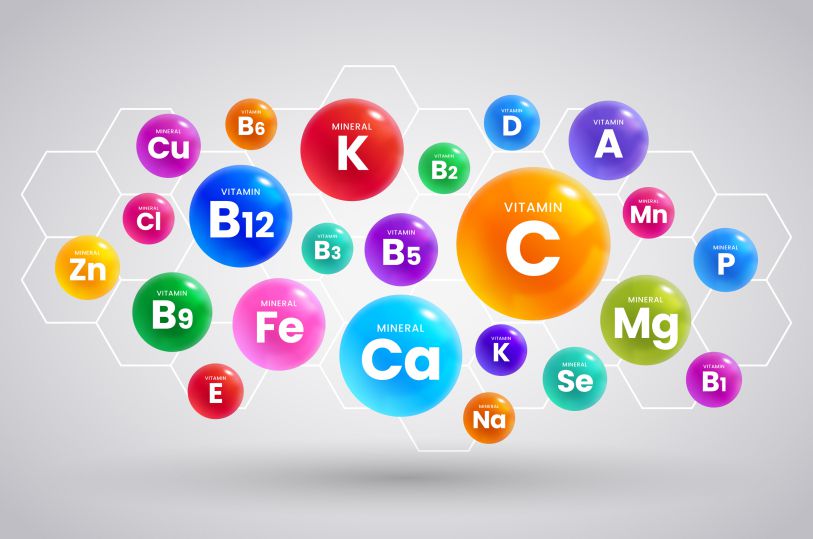Do you know all the Vitamin groups and types we talked too much about? Let’s dig deeper to find a lot about this such an important compound.
As an essential substance of organic molecules, vitamins are needed for staying healthy and functioning properly. Achieve the recommended daily intake through a healthy diet.
The main 13 types of vitamins are listed below and each of them plays a vital role in the human body.
1. A
2. B1
3. B2 – riboflavin
4. B3 – niacin
5. B5 – pantothenic acid
6. B7 – Biotin
7. B6
8. B12 – cyanocobalamin
9. B9 – Folate
10. C
11. D
12. E
13. K
So, there are two main groups of vitamins:
- fat-soluble vitamins,
- water-soluble vitamins.
The main difference between these two groups of vitamins is how they interact with the body when ingested. Fat-soluble vitamins – A, D, E, and K – are soluble in organic solvents and absorbed easily. They are able to be stored in the body within the fat cells and consumed eventually in some period. Water-soluble vitamins – all types of vitamin B and C – are removed from the body by urine. If they aren’t used or absorbed shortly after ingesting, they’re flushed out of the body. Hence, they need to be taken regularly.
Importance, sources and deficiency of Vitamins
Now, let’s take a close look at what each vitamin groups are important for, meals rich in that type, and what the deficiency may cause to your body.
| Vitamins | Important for | Good Sources | Deficiency |
| #A | Healthy heart and lungs, better vision, improved immune system, healthy teeth, and bones support, soft growth of muscle tissues, healthy skin. | Carrots, eggs, broccoli, fish, cantaloupe, sweet potato, milk, pumpkin pie, liver, etc. | Xerophthalmia, fat malabsorption, liver disorders |
| #B (B1, B2, B3, B5, B6, and B12) | Cell health, healthy brain function, good appetite, red blood cell improvement, proper nerve function, cholesterol production. | Bread, eggs, nuts, legumes, whole grains, dark, leafy vegetables, fish, meat, fruits, etc. | Atrophic gastritis, fatigue, dermatitis, immune system disorders, nausea, etc. |
| #C | Straightens the immune system, formats collagen, absorbs iron, drives the oxygen into the body, heals wounds, maintains cartilage, bones, teeth. | Citrus fruits, pineapple, tomatoes, potatoes, all types of berries, watermelon, spinach, cabbage, etc. | Scurvy, fatigue, depression, anemia, connective tissue defects, weak immunity, etc. |
| #D | Calcium and phosphate amount regulation, bone tissues growth,healthy teeth and muscles. | Fortified margarine, yogurt, beef liver, cod liver oil and oily fish, milk, cheese, eggs, etc. | Bone deformities and pain, specific medical conditions, chronic diseases, etc. |
| #E | Skin health, cell protection, healthy eyesight, strong immune system. | Seeds, margarine, wheat germ, green leafy vegetables, vegetable oils, nuts, margarine, corn, etc. | Neuropathy, cholestasis, difficulty walking, weak muscles, red blood cell breakdown. |
| #K | Wound healing, bone health, blood coagulation, proper blood clotting, healthy hair. | Prunes, cauliflower, green leafy vegetables, wholemeal flour, broccoli, fish, liver, kiwi, avocado, meat, eggs, cereals, berries, etc. | Serious internal bleeding, insufficient dietary intake, internal clot formation, inadequate absorption, liver, and heart disease. |






